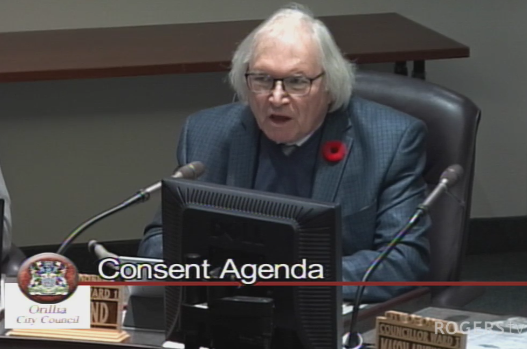Orillia politicians kicked off their 2020 budget deliberations Monday afternoon with a 3.5-hour introduction to the process and some background on a few key issues that will be up for debate in the coming weeks.
While subject to change, the initial forecast calls for a 3.3 per cent tax hike for Orillia homeowners - that’s if city council approves all of the recommendations made by city staff.
At this point, nothing is written in stone.
On Thursday, local boards and agencies - ranging from the County of Simcoe to the Orillia Public Library - will make their pitches for cash at City Hall.
Then, councillors will get into the nitty-gritty decision making over four, likely long days. On Nov. 27 and 28, council will grapple with its $60-million operating budget via a line-by-line review process.
Then, on Dec. 2 and 3, councillors will determine how many of more than 90 capital projects will get the green light. There is almost $2 million set aside for capital projects for 2020.
“During budget deliberations, council will take into consideration investing in infrastructure, maximizing cost savings and providing contributions to our reserves to save for future needs,” said Mayor Steve Clarke.
“Council’s goal is to approve a 2020 budget that is responsible to the taxpayer and ensures we can maintain our current and future assets,” said the mayor.
City treasurer Jim Lang provided council with an overview of the process and what they can expect in the coming days.
“It’s often said we operate in a world of uncertainty and that is very true when it comes to municipal budgeting,” said Lang.
Sometimes that uncertainty is good news, he said, referencing a $473,000 property tax transition grant and a provincial service and delivery efficiency grant of $520,000 the city received this year.
In addition, almost $600,000 was expected to be spent on operating costs for the new recreation centre - money that has been saved because of the delay in its opening.
There’s also been some bad news. Lang noted tax assessment appeals are about $385,000 higher than anticipated and noted the city will have to fork out more than expected to the County of Simcoe for rising health and social services costs resulting from provincial downloading.
Despite that, Lang said he expects the city to be in a surplus position at year’s end.
But the future is not all rosy, Lang warned.
“You’ve all heard the term ‘infrastructure deficit’ or shortfall,” Lang told councillors. “Internationally, nationally, provincially and locally, we are all faced with the same issue: the cost to maintain and replace existing assets is greater than financial resources available.”
He said “that theme” will rear its ugly head often during budget deliberations.
And that means it may be time to consider debt.
Lang said “the key strength to the city’s financial situation is the low level of external debt.”
Considering the “major infrastructure investments made in recent years” that is positive, said Lang, noting the city has just one external debenture of $6 million being repaid at $2 million annually, maturing in 2022.
“Investments have been made in modernizing key public and service delivery buildings coupled with ongoing investments in roads, water, waste-water and storm-water infrastructure,” noted Lang.
However, that has led to several reserves having significant, multi-million-dollar deficits.
“One of the keys is to continue building on establishing healthy and resilient reserves,” said Lang, noting council has, over the last six years, made “significant contributions” to reserves.
“That focus will need to continue because (of) the infrastructure replacement needs faced by Orillia," said Lang.
“One option available to council is to leverage the fact that the city has very low external debt to assist reserves in quicker growth. In very simple terms, the city can consider strategically using external debt - call it debenture, capital loan or mortgage - instead of using reserves that don’t have sufficient funds,” said Lang.
That’s an idea Coun. Ted Emond believes has merit.
He said, at present, the city only considers projects and initiatives based on available funds.
“I appreciate that in these times when interest rates are exceptionally low, available funding is not necessarily finite in the sense that it’s not just necessarily the money we can extract from taxpayers in the levy,” said Emond.
“There is an opportunity to do some other things,” he noted, referencing going into debt.
He said some capital projects might merit such an approach.
“There are opportunities we face in the city (that) if we invest in them, we may generate revenues” that make the project worth fast-tracking.
He cited a move to LED street lighting as an example. (Watch for a story on that later today)
He also referenced the need to have more land available for future development.
“I know we’re facing some economic development challenges having to bring potentially new employment lands on stream, but without them, we can’t attract the industry we need here, so these are investments that are critical,” said Emond.
The second-term Ward 1 councillor said he is ”absolutely convinced” there are not enough funds to pay for the projects that are necessary.
“I think it’s a time in this council and time in our city when we may want to consider very seriously as a council that the magic and excellence that staff have done in managing our capital program and operational program by cash flow has reached its limit,” said Emond.
“And in order to protect our community and our assets in the future and allow it to grow and expand, there are some investments we may need to make.”
No decisions were made Monday. Decisions will be deliberated for five days over the next two weeks before the budget is ratified by council at a special meeting Dec. 9.
All budget meetings are held at city hall and are open to the public, though councillors may move discussions into closed session periodically.
To read the budget documents, go to orillia.ca/budget.